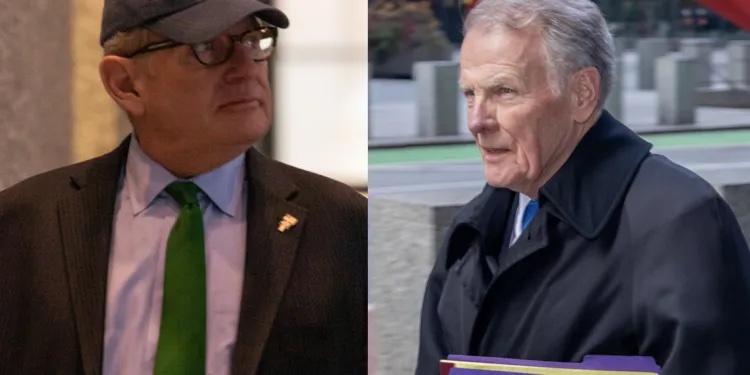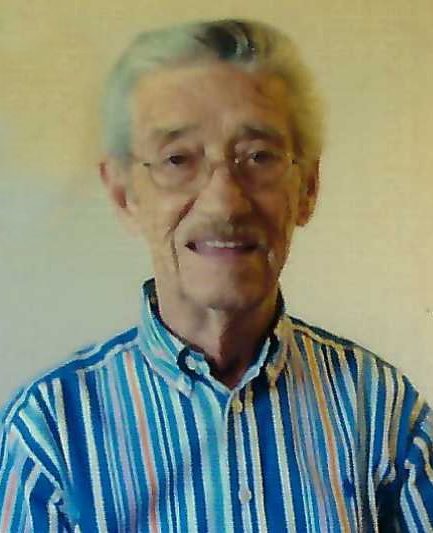Madigan corruption trial breaks for holidays amid defense case; McClain declines to take the stand

CHICAGO – Before jurors in former Illinois House Speaker Michael Madigan’s trial departed the Dirksen Federal Courthouse for a two-week break, they heard glowing testimony from the ex-speaker’s former chief legal counsel – who also happens to be a sitting judge.
Madigan’s attorneys called 1st District Appellate Court Justice David Ellis to the witness stand about 90 minutes before the trial adjourned and spent most of that time letting Ellis praise the former speaker’s leadership style. Ellis described how, as chief lawyer in the speaker’s office, he was assigned deep dives into legislation that “would directly impact consumers” – including energy-related bills.
“We weren’t going to let people get ripped off by big business,” Ellis said of the general directive he got when negotiating such proposals. “Just don’t let consumers get screwed, basically.”
And that was true for a 2011 bill Ellis negotiated with electric utility Commonwealth Edison, he testified.
“I don’t mean this as insulting, but I don’t trust ComEd to write anything that isn’t in their best interest,” Ellis said.
The feds allege the 2011 “Smart Grid” law was the first of several legislative efforts ComEd pushed – and in one case opposed – with the powerful speaker’s backing as the result of bribes in the form of jobs and contracts for Madigan allies.
Ellis had begun negotiating the bill in early 2011 and it passed the General Assembly on a bipartisan vote in May of that year, followed by a veto from then-Gov. Pat Quinn, a Democrat. But prosecutors argue lawmakers overrode the veto only after ComEd granted a no-work contract to a Madigan ally and hired a Democratic fundraiser’s law firm under pressure from ComEd lobbyist and Madigan confidant Mike McClain.
McClain was already convicted along with three other former ComEd lobbyists and executives of bribing the ex-speaker in a separate trial last year and is Madigan’s co-defendant in the current trial.
Read more: ‘ComEd Four’ found guilty on all counts in bribery trial tied to ex-Speaker Madigan
The jury already heard from the man on the other side of the negotiating table, ComEd’s former head attorney, earlier in trial. Ellis on Thursday tread the same ground, saying he insisted on provisions that would void the law if ComEd didn’t reach certain goals like electricity grid investments, in-state job creation and minimizing rate increases.
“Were you ever negotiating on behalf of ComEd?” Madigan attorney Todd Pugh asked.
“Certainly not,” Ellis replied. “The complete opposite of that.”
Asked if Madigan ever told him to “soften your position on ComEd,” Ellis laughed.
“If he ever said to go easy on someone whose bill we were reviewing, I think I would’ve fallen out of my chair,” he said. “That was just not what we did. That was not how it worked.”
Ellis’ testimony provided a stark contrast to how prosecutors presented the ComEd-backed bills as they were laying out their bribery and racketeering case against Madigan and McClain. When ComEd exec-turned-cooperating witness Fidel Marquez was called to the stand last month, the first email prosecutors asked him about involved Madigan permitting ComEd to kill a proposal pushed by his daughter, Illinois Attorney General Lisa Madigan.
At the time, the attorney general was in the final year of her fourth term and was pushing for legislation that would have expanded eligibility for low-income energy bill assistance and leniency for those behind on their bills. ComEd viewed it as a “cost shift” to non-low-income customers, which would result in higher bills – something the company wanted to avoid.
“This is her legacy initiative,” McClain said of Lisa Madigan in the May 2018 email to ComEd executives.
The email – and wiretapped phone calls introduced later by both the government and McClain’s attorneys – reference a communication from Madigan the month before, which McClain said was “code for we can go ahead and kill it.” But ComEd failed to act quickly enough, and McClain advised the utility would need to pull out all the stops to defeat the proposal, which he said had gained “substantial momentum.”
He suggested ComEd mobilize organized labor, business interests, vendors, municipal leaders and faith leaders against the proposal, and it ultimately died.
As Madigan’s attorney went back over that email with Marquez on cross-examination in mid-November, Lisa Madigan was sitting in the courtroom gallery watching proceedings.
Read more: Judges, ex-lawmakers, lobbyists wrote to support convicted ex-Madigan aide | Ex-Madigan aide sentenced to 30 months in prison for obstruction of justice attempt, perjury
Ellis on Thursday praised Madigan as a person who was “very interested in getting the right answer” and was far less concerned about “whose idea it was.”
“He didn’t want a bunch of yes men telling him how great he was,” Ellis said. “If you had better idea … he wanted to hear it.”
A longtime assistant in Madigan’s 13th Ward office the former speaker shared with the local alderman also briefly testified Thursday. April Burgos described the former speaker as “one of the most nicest, genuine people I’ve ever met in my life.”
Burgos’ name was on many emails shown throughout trial as an intermediary for messages to Madigan because the speaker didn’t use email or a cell phone. She also testified that the constituent services the 13th Ward provided were available to everyone regardless of their political affiliation.
“There’s been numerous times where people have come to office and talk negatively about him (Madigan) and I still helped them,” Burgos said. “That was instilled in me.”
Some of the most puzzling testimony of the day came from a real estate developer whose project ended up spurring the FBI’s interest in Madigan in 2017. Andy Cretal, a Virginia-based developer whose former employer ZOM Living was behind the Union West apartment complex in Chicago’s West Loop neighborhood, was the first witness Madigan’s attorneys called in their case.
In June 2017, Madigan called Chicago Ald. Danny Solis out of the blue to ask him about Cretal’s proposed project, which he said he’d just read about. But Solis, whose 25th Ward included the West Loop and who chaired the city council’s powerful Zoning Board, was a year into cooperating with the FBI and agents were listening in to every call.
“Do you know the developer?” Solis asked Madigan.
“No, but I’d like to,” the speaker replied.
At the FBI’s direction, Solis later set up a meeting between Cretal and Madigan at the downtown Chicago office of the speaker’s property tax appeals law firm. But before that, Solis told Madigan that Cretal understood “how this works, you know, the quid pro quo,” implying that Solis would hold up necessary approvals for Cretal’s project unless Madigan’s law firm was hired to handle property tax business for Union West.
But it wasn’t true; Solis had not said that to Cretal and had already committed to approving the zoning changes once the city had finalized building guidelines for the booming West Loop neighborhood later that summer.
Before the meeting with Cretal in July 2017, Madigan scolded Solis for using the phrase “quid pro quo,” telling the alderman he “shouldn’t be talking like that” and that Solis was merely “recommending our law firm because if they don’t get a good result on the real estate taxes, the whole project would be in trouble.”
The feds have characterized Madigan’s pre-meeting chiding as him providing a cover story for Solis and charged the former speaker with extortion.
But Madigan’s attorneys tried Thursday to find out if Cretal really did feel extorted.
“In your conversations with Mr. Madigan, did you ever feel fearful or intimidated or threatened into hiring their firm?” attorney Dan Collins asked.
“I did not,” Cretal replied.
“And in your interactions with Mr. Solis, did you ever identify that you needed to hire this law firm in order to get him to act on the Union West development?” Collins asked.
“I did not,” Cretal said again.
Cretal testified that he’d been impressed with Madigan’s law partner, Vincent “Bud” Getzendanner, who’d done most of the talking during that July 2017 meeting. He dealt with Getzendanner when he hired the firm a couple months later.
But on cross-examination from the government, Cretal said Solis’ request to meet with Madigan was unusual – and made him nervous. That’s why he asked a local partner in the Union West development to come along to the meeting.
“You wanted a second set of eyes and ears, right?” Assistant U.S. Attorney Sarah Streicker asked.
“Yes,” Cretal said.
Streicker asked if Cretal “feared” that not at least taking a meeting with Madigan might jeopardize the Union West project’s approval.
“That was a fear,” he confirmed.
But on further questioning from Collins, Cretal affirmed that his apprehension was replaced by being impressed by Getzendanner’s presentation, and that he never called Solis to tell him he’d hired the firm. Though Solis didn’t call to ask Cretal about it until March 2016, the jury has previously heard evidence that Madigan informed Solis that the firm was hired – though only after the alderman followed up to ask.
Earlier on Thursday, prosecutors finished cross-examining McClain’s only defense witness, retired AT&T Illinois lobbyist Steve Selcke. He countered the feds’ theory that hiring former Democratic state Rep. Eddie Acevedo on a consulting contract in 2017 was meant as a bribe to Madigan. At the time, the company had major legislation pending in the General Assembly.
Read more: Prosecution rests in Madigan trial as defense calls witness dropped from feds’ list | Former Madigan ally contradicts past statements after being ordered to testify
On cross-examination, Assistant U.S. Attorney Julia Schwartz introduced a 2016 email from Selcke to his colleagues discussing setting aside $60,000 from the company’s legislative affairs budget as a contingency fund for future requests from “our friend in Quincy,” a reference to McClain.
Selcke testified that McClain’s intervention in 2015 and early 2016 had led to AT&T retaining former state Rep. Annazette Collins and Acevedo’s sons as consultants, even though they’d already been told their contracts wouldn’t be renewed for 2016.
In his email a year later, Selcke warned his colleagues about leaving that door open to McClain – and said their boss, AT&T Illinois president Paul La Schiazza needed to understand what might happen.
“That would be OK with me as long as we realize, and make Paul aware, that if we get folks crammed back down our throats we will have to steal from invest in Illinois,” Selcke wrote.
Acevedo, who was ordered to testify earlier this week as prosecutors closed out their case, already served six months in prison for tax evasion uncovered in the wider Madigan investigation. His sons also served short sentences for the same. Annazette Collins is currently serving a one-year sentence for tax evasion.
La Schiazza’s trial on charges he bribed Madigan ended in a hung jury in September. After a judge last week refused to acquit him, La Schiazza’s new trial is set for June 3.
Read more: Judge won’t acquit former AT&T Illinois boss in Madigan bribery case after hung jury
After the jury had gone home, McClain officially waived his right to testify in his own defense, telling U.S. District Judge John Blakey he’d talked it over with his attorney “several times.”
“Do you want to testify in your case?” Blakey asked.
“No thank you, your honor,” McClain said.
Capitol News Illinois is a nonprofit, nonpartisan news service that distributes state government coverage to hundreds of news outlets statewide. It is funded primarily by the Illinois Press Foundation and the Robert R. McCormick Foundation.
This article first appeared on Capitol News Illinois and is republished here under a Creative Commons license.
Miss Clipping Out Stories to Save for Later?
Click the Purchase Story button below to order a print of this story. We will print it for you on matte photo paper to keep forever.

